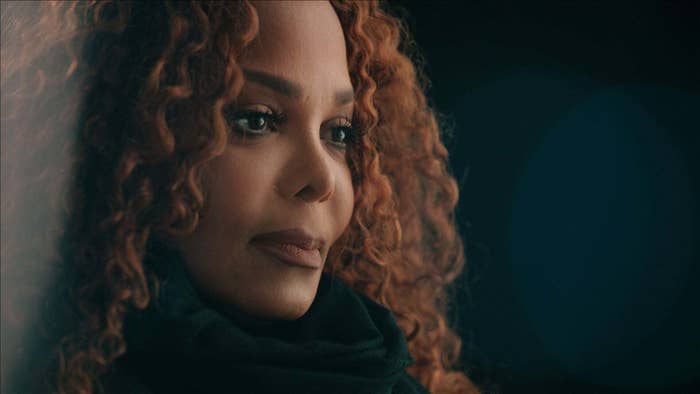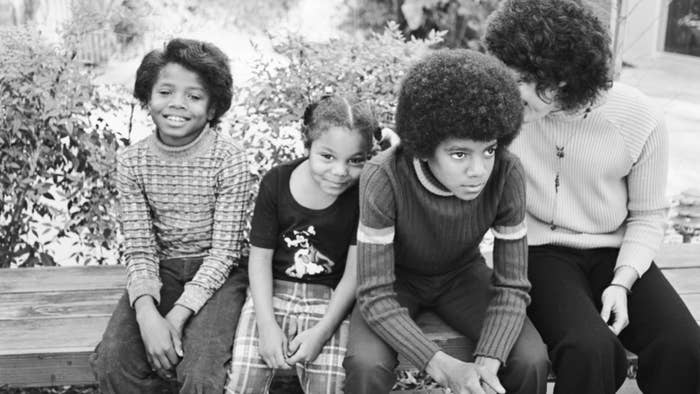
Janet Jackson, a new documentary airing on A&E and Lifetime in two parts this Friday and Saturday, opens with the pop star and a camera crew touring the singer’s hometown of Gary, Indiana, a place she hasn’t visited since she was 8 years old. “You’ve been very private about your personal life up until now,” an unnamed producer says to Janet. “Why did you want to do this documentary?”
“It’s just something that needs to be done,” Janet responds. “You’ve had someone write this unauthorized biography or someone else do something, or they’ll do a movie and it’s…” She doesn’t finish the thought because she spots a gigantic black-and-white mural of her brothers on the side of a building. It’s an image she’s never seen before. The looming portrait features Jackie, Tito, Jermaine, and Marlon with their eyes tilted toward the heavens while Michael looks straight ahead. “Oh, I love that,” she says, tearing up while the camera lingers on the star.
It is a surprisingly vulnerable display of emotion for someone who has fiercely guarded their privacy. But after watching the first half of this documentary, it’s clear that such vulnerability is rare throughout. Promotional materials for this project, which was executive produced by Janet and her brother Randy, claim that “JANET JACKSON. lifts the lid on her private life for the very first time and reveals the most intimate moments of the star ever caught on camera.” But while it’s true that there are filmed moments that haven’t been made public before and Janet’s involvement in this documentary sets it apart from Malfunction: The Dressing Down of Janet Jackson, the New York Times documentary that aired on Hulu last year, for the most part the documentary touches only sparingly on some of the most dramatic and public aspects of her career.
Interesting threads about her sheltered and unusual upbringing come up but never quite connect. You get an inkling that there’s more the star could say, especially when it comes to familial trauma, but her interviewers never push her. Of the process of making the documentary, critic Robin Givhan, who profiled Janet for an Allure magazine cover story, noted, “she does not like being interviewed because she doesn’t think she’s very good at soul-searching on demand, at speaking her truth in pithy sound bites.”
Because of this restraint, there are key situations and topics that the artist doesn’t really explore in depth — from her father’s alleged physical abuse of her siblings to how she really felt about Michael’s child sexual abuse allegations and their effect on her career. It becomes increasingly clear that there are parts of her life the 55-year-old still hasn’t fully grappled with. “It doesn’t matter how much work you do, it’s still painful,” she says during one particularly stirring moment toward the end of the first hour of Part 1. In the first half of the documentary, Janet’s story unfolds as a typical tragic music story, filled with highs and lows, and punctuated with small flashes of intrigue that aren’t examined in a way that feels complete.

Naturally, the documentary begins with the success of Janet’s older brothers. We learn how the Jackson 5 came to prominence, how Janet emerged in the group’s shadow, and then later excelled as a pop act in her own right. But Joe’s appalling behavior toward his children, which has been well documented, is glossed over. “My parents disciplined all of us, but that’s how we, as a people, raised our kids,” Janet says, a quote that comes immediately after the memorable scene in which the singer’s Good Times character, Penny Gordon, opens up about the abuse she received from her fictional mother and is subsequently adopted by Willona Woods (Ja'Net DuBois). Both Janet and Randy seem to delicately dance around how strange their childhood was, and for a supposed tell-all, it leaves you wondering what footage may have been left on the cutting room floor, especially since the documentary was filmed over the course of five years. “Discipline without love is tyranny, and tyrants they were not,” Janet says. “They just loved us and wanted us to be the best that we could possibly be. Obviously it worked.”
Her relationship with brother Michael receives pat treatment, too. Janet discloses that the most famous member of the Jackson bunch would call her horrible names when they were children, including “pig, horse, slaughter hog, cow.” She admits they would both laugh sometimes, but that the jokes affected her on a deeper level and altered the way she saw her body. When Michael’s 1993 child sexual abuse case occurred, it clearly adversely affected her career, but Janet doesn’t say that. In rare footage, we see Janet and her then-husband René Elizondo Jr. meeting with Coca-Cola executives, with everyone in the room talking about how thrilled they were to partner with Janet. But the opportunity wouldn’t pan out because of the allegations against her brother at the time (Michael eventually settled out of court). It’s difficult to discern how Janet felt about the deal falling through, and viewers aren’t given much to work with. Janet merely says something about guilt by association, and then the documentary proceeds.
There are undeniably a few bright spots in the documentary. Janet’s former husband of nine years, Elizondo, provided access to footage he recorded of the singer. There’s tape of him proposing to Janet, as well as a peek into the sometimes tense moments with producers Jimmy Jam and Terry Lewis while the singer was recording Rhythm Nation 1814, the follow-up to 1986’s Control, which helped her blossom as a legitimate artist. We even see Janet’s frustrations with Elizondo’s constant video recording. There’s a clip where he wants her to kiss her mother Katherine on the cheek, and Janet, obviously annoyed, refuses because it wouldn’t be “candid.” The portion of the documentary that highlights the relationship between Janet and Elizondo feels the most fleshed out too, because it delves into the influence he assumed merely by being in proximity to her. “He had so much power off her back that you just didn’t cross René,” says Wayne Scot Lukas, a celebrity stylist who worked with Janet for more than a decade.
There’s a raw and emotional scene in the last few minutes of the first part of the documentary, where Janet talks about the dissolution of her first marriage to James DeBarge, whom she started dating as a teenager. “I was just incredibly innocent. That’s the thing. That innocence,” she says. “It’s just, to me, hurtful for someone to see that and just try to take advantage of it.” She stops the interview short, telling a producer, “Ben, I don’t want to talk about this anymore.” It’s a sentiment that could just as easily apply to her parents or the press.
The second half will examine how the singer feels about the infamous 2004 “wardrobe malfunction” at the Super Bowl and her thoughts on Justin Timberlake now. Janet famously said it would be her last time discussing the incident when she spoke to Oprah about it in 2006. But since Timberlake headlined the halftime show again in 2018, fans have eagerly wondered how the singer felt about him. One can only hope that the final part of the documentary is more illuminating than the first half, but as it stands, unfortunately, after all these years, it feels like we still haven’t scratched the surface of who Janet is.●
